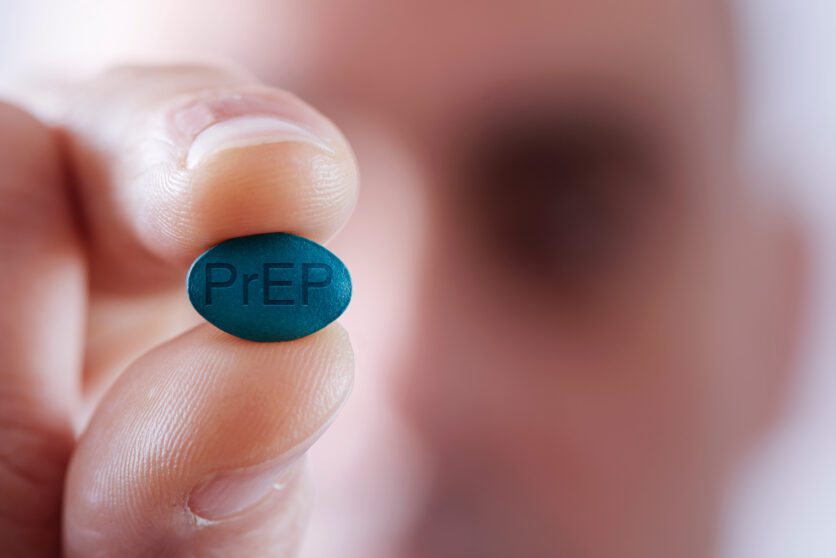
Post-SSRI Sexual Dysfunction: How to Protect Yourself From This Side Effect

Sexual dysfunction has been a known side effect of SSRIs for some time, but the length of that dysfunction is often much longer than many realize

Share
on this page:
Stacey Harder, an author in Melbourne, Australia, has struggled with anxiety related to early traumas for most of her life. Eventually, she decided it was time to speak with her doctor about the condition and consider starting medication. Antidepressant medications, such as SSRIs (selective serotonin reuptake inhibitors) and SNRIs (serotonin-norepinephrine reuptake inhibitors), are commonly prescribed for anxiety, and her doctor suggested that she try taking one.
Along with lifestyle changes such as regular therapy, yoga, and writing, Harder started taking an SSRI. She checked in with her doctor weekly to discuss how she felt and if any new side effects emerged. One of the side effects that surfaced was sexual dysfunction — Harder says she lost the ability to orgasm.
“It wasn’t that my libido had disappeared or that I didn’t want to be intimate with my partner. It was just that when we were being intimate, I just couldn’t get across the finish line. And it was very frustrating,” she says. “It was affecting my relationship.”
She’s not alone. For years, advocates and researchers have been drawing attention to sexual dysfunction associated with antidepressants, which, for some, may even continue long after they stop taking the drug.
Understanding Antidepressants
There is some debate about exactly how antidepressants work to help people with depression, but it’s known that they typically increase levels of a chemical in the brain called serotonin. While researchers have recently begun questioning whether people with depression actually have lower levels of serotonin than their counterparts without depression, evidence from clinical trials does suggest that antidepressants help many people with depression (particularly those with the most severe symptoms) along with anxiety, post-traumatic stress disorder (PTSD), and other conditions.
SSRIs are considered a frontline treatment for depression, but like most medications, they come with complicated side effects — including sexual dysfunction.
Common Side Effects of Antidepressants
Some common side effects of antidepressants include:
- Drowsiness
- Weight gain
- Insomnia
- Anxiety
- Dizziness
- Headache
- Dry mouth
- Blurred vision
- Nausea
- Rash
- Tremor
While many people are aware that sexual dysfunction can be a key side effect of antidepressant use, fewer may be aware that, in some cases, this condition can last long after someone stops taking their medication—and can, in rare cases, be irreversible. This condition is called post-SSRI sexual dysfunction (PSSD).
General Sexual Dysfunction Vs Post-SSRI Sexual Dysfunction (PSSD)
Sexual dysfunction, which can be caused by a wide range of medications including antidepressants, is a broad term that covers various issues preventing an individual from experiencing satisfaction during sexual activity. This can include problems such as:
- Low libido: A reduced interest in sexual activity
- Arousal difficulties: Trouble becoming or staying aroused, which might involve insufficient vaginal lubrication in women or difficulty achieving or maintaining an erection in men
- Orgasmic disorders: Difficulty reaching orgasm or experiencing delayed or absent orgasms
- Pain during sex: Experiencing discomfort or pain during sexual activity
What differentiates PSSD from general sexual dysfunction caused by antidepressants is that the symptoms of PSSD continue after antidepressants have been stopped, and in rare cases, may continue indefinitely.
While there is some overlap between the symptoms of general sexual dysfunction and PSSD, there are some noted differences — which are essential for patients and physicians to understand so the condition can be caught earlier rather than later.
Symptoms of PSSD include:
- Genital anesthesia (loss of sensation in the genital area, which can be described as numbness or reduced sensitivity)
- Erectile dysfunction
- Orgasmic/ejaculatory anhedonia (the inability to experience pleasure or satisfaction during orgasm or ejaculation
While the sexual side effects of antidepressants are generally recognized, there are likely many people who never discuss them with their doctor prior to a prescription—which means they certainly are not aware of the fact that these sexual issues could continue long after they taper off.
One small study from 2021 notes that out of 239 people living with PSSD, only 12% said they were counseled by their doctor about the sexual side effects from SSRI use. What’s more, over 80% of respondents reported that the impact on their quality of life was very negative.
Persistent Sexual Dysfunction: A Petition to Raise Awareness
In 2018, RxISK.org filed a citizen petition with the European Medicines Agency, Health Canada and the FDA, urging them to update warnings on SSRIs and SNRIs—such as Paxil, Prozac, and Effexor—to include the risk of persistent sexual dysfunction even after discontinuation and to send “Dear Health Care Provider Letters” that educate prescribers about the fact that these side effects can persist and offer guidelines to discuss the risk with patients.
Led by Dr. David Healy, the petition was signed by 22 scientists and healthcare professionals.
After the petition was filed, drug regulatory agencies in both Europe and Canada acted, making sure to put out warnings about the risk of sexual side effects after antidepressant cessation.
The FDA, however, never responded. Because of its inaction, Public Citizen, a nonprofit consumer advocacy organization, filed a lawsuit against the FDA hopes of forcing a response. The case is not yet resolved.
Protecting Yourself From PSSD: Questions to Ask Your Doctor
While concerning, the risk of PSSD appears rare: According to one 2023 study (frustratingly only focused on men), four out of 100,000 people may be affected. On the other hand, a lack of widespread recognition of this condition among both patients and doctors most likely makes it difficult for people to recognize that the symptoms they’re going through are actually caused by their medication—which may mean the number of cases is higher and simply underreported.
Despite this worrying side effect, SSRIs remain a crucial part of depression treatment for many people. This is why paying attention to how you feel after you start taking them is critical. Pay attention to any new thoughts, feelings, and/or habits that emerge. Consider using MedShadow’s symptom tracker to keep tabs on any changes that might coincide with your use of the medications so you can discuss them with your physician.
If you or someone you love is taking an SSRI or SNRI or considering it, here are some questions to ask your doctor:
- What are the most common side effects of this medication?
- Why did you choose this particular medication for me? How do other patients like me do on it?
- What are the most severe side effects of this drug? Are there symptoms that should prompt me to call you or visit the emergency room, even if they are rare?
- How long should I expect to take this drug? How will we know when it’s time for me to stop?
- How long does it take to taper off of this drug if we decide I don’t need it anymore?
- How often do patients report sexual dysfunction?
- If I do experience sexual dysfunction, what can I do about it? How likely is it to last indefinitely?
If you believe you may be dealing with post-SSRI sexual dysfunction, this condition is nothing to be embarassed about. If you’re feeling squeamish about talking about it with your doctor, consider the fact that it’s a real side effect, rather than a personal inadequacy. Starting the conversation about your symptoms can be the first step in a successful journey towards regaining an important part of your life.
Additional reporting for this article was done by Heather Cottrell
- Moncrieff, J., Cooper, R. E., Stockmann, T., Amendola, S., Hengartner, M. P., & Horowitz, M. A. (2022). The serotonin theory of depression: a systematic umbrella review of the evidence. Molecular Psychiatry, 28(8), 3243–3256. https://www.nature.com/articles/s41380-022-01661-0
- Sheffler, Z. M., Patel, P., & Abdijadid, S. (2023, May 26). Antidepressants. StatPearls – NCBI Bookshelf. https://www.ncbi.nlm.nih.gov/books/NBK538182/
- Fournier, J. C., DeRubeis, R. J., Hollon, S. D., Dimidjian, S., Amsterdam, J. D., Shelton, R. C., & Fawcett, J. (2010). Antidepressant drug effects and depression severity. JAMA, 303(1), 47. https://pubmed.ncbi.nlm.nih.gov/20051569/
- Ben-Sheetrit, J., Hermon, Y., Birkenfeld, S., Gutman, Y., Csoka, A. B., & Toren, P. (2023). Estimating the risk of irreversible post-SSRI sexual dysfunction (PSSD) due to serotonergic antidepressants. Annals of General Psychiatry, 22(1). https://www.ncbi.nlm.nih.gov/pmc/articles/PMC10122283/
- Leslie, S. W., & Sooriyamoorthy, T. (2024, January 9). Erectile dysfunction. StatPearls – NCBI Bookshelf. https://www.ncbi.nlm.nih.gov/books/NBK562253/
- Peleg, L. C., Rabinovitch, D., Lavie, Y., Rabbie, D. M., Horowitz, I., Fruchter, E., & Gruenwald, I. (2021). Post-SSRI Sexual Dysfunction (PSSD): biological plausibility, symptoms, diagnosis, and presumed risk factors. Sexual Medicine Reviews, 10(1), 91–98. https://www.sciencedirect.com/science/article/abs/pii/S2050052121000603
- Studt, A., Gannon, M., Orzel, J., Vaughan, A., & Pearlman, A. M. (2021). Characterizing post-SSRI sexual dysfunction and its impact on quality of life through an international online survey. International Journal of Risk & Safety in Medicine, 32(4), 321–329. https://content.iospress.com/articles/international-journal-of-risk-and-safety-in-medicine/jrs210039
- FDA sued over inaction on Citizen Petition – Public Citizen. (2024, May 20). Public Citizen. https://www.citizen.org/news/fda-sued-over-inaction-on-citizen-petition/
- Healy, D., & Mangin, D. (2024). Post-SSRI sexual dysfunction: barriers to quantifying incidence and prevalence. Epidemiology and Psychiatric Sciences, 33. https://www.cambridge.org/core/journals/epidemiology-and-psychiatric-sciences/article/postssri-sexual-dysfunction-barriers-to-quantifying-incidence-and-prevalence/EF502A763704810C127E2561CFB52FD2
DISCLAIMER: MedShadow provides information and resources related to medications, their effects, and potential side effects. However, it is important to note that we are not a substitute for professional medical advice, diagnosis, or treatment. The content on our site is intended for educational and informational purposes only. Individuals dealing with medical conditions or symptoms should seek guidance from a licensed healthcare professional, such as a physician or pharmacist, who can provide personalized medical advice tailored to their specific circumstances.
While we strive to ensure the accuracy and reliability of the information presented on MedShadow, we cannot guarantee its completeness or suitability for any particular individual’s medical needs. Therefore, we strongly encourage users to consult with qualified healthcare professionals regarding any health-related concerns or decisions. By accessing and using MedShadow, you acknowledge and agree that the information provided on the site is not a substitute for professional medical advice and that you should always consult with a qualified healthcare provider for any medical concerns.
on this page:
RECOMMENDED:
DONATE:
Help fund our fight for improved medication safety and transparency by supporting our independent journalism.
Give NowStay Informed. Sign up for our newsletters.
Independent, science-based journalism delivered directly to your inbox.
About Our Advocacy:
We seek to create a world where there are safer medications for all and where all people are fully informed about their medication benefits and side effects, using our explanatory and investigative journalism to both inform and stimulate public discussion to drive toward solutions.
WEBINARS
Want to hear expert insights about medication safety and other care options? Watch all our past webinars and sign up for upcoming ones.
WATCH Now


